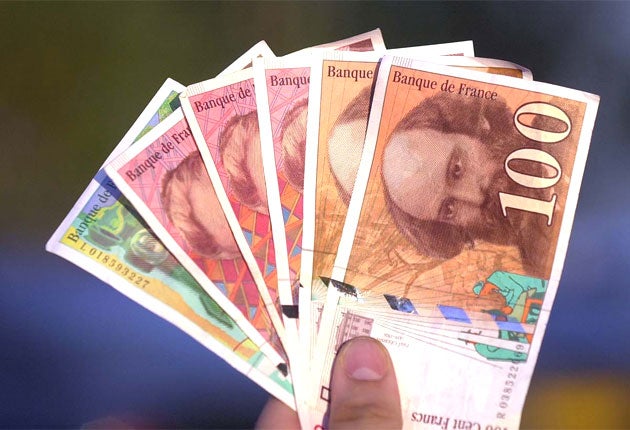French town cashes in on forgotten francs
Shopkeepers invite customers to spend their old notes before it's too late

The small town of Le Blanc in the centre of France has found a way to boost business during the downturn. It has invited the French to turn back the clock and shop with francs.
Local businesses are celebrating the fact that they have collected Fr1m since they declared three years ago that the old currency would still be accepted over their counters.
Although francs were replaced by the euro in 2002 it seems many people in France are reluctant to say goodbye to their old currency. According to the Bank of France, notes worth Fr4bn – the equivalent of €625m – have never been exchanged and are still unaccounted for.
The success of the operation in Le Blanc has surprised even the townspeople. Sylvie Moënne-Loccoz, the president of the local chamber of commerce, is banking on reaching Fr2m by February 2012, when the old currency will no longer be officially exchangeable.
The plan was devised as a way of bringing in more business to the town of 7,000 inhabitants and is not a protest against the euro. "Only notes are accepted as payment and all the change that is given to the customers is in euros," said Ms Moënne-Loccoz.
"Everyone has suffered from the recession, but all the same our trading has risen by 10 to 20 per cent in the last three years." Furniture shops and electrical goods stores have been the main beneficiaries of the scheme.
"Our customers travel from all around to spend money they have found," explained Ms Moënne-Loccoz.
Many of the customers have a story to tell about how they discovered their old bank notes. A grandmother found a Fr200 note in her soup tureen while looking for her glasses. A son, who was sorting out his deceased parents' affairs, found a Fr500 note slipped into the pages of the lease on the family house, as if his parents had wanted him to find it.
Carpentras, in Provence, is also using its winter sales as an opportunity to attract business in francs. Marc Attal, who is the president of the local shops, said: "Until 31 March we accept exchangeable franc notes for every purchase."
Exchanging francs officially at the Bank of France can be long and complicated. You often have to travel up to 60 miles to find an office willing to carry out the transaction, and you have to explain where the money came from.
Marc Bovy, a currency expert, says it can be more profitable to sell an old note to a collector than to the Bank of France. For example, a Fr500 note, bearing the image of the 17th-century writer Pascal, "without folds or stains, printed in 1968 or 1969, could reach a value of €600," he said. This compares with a face value of about €75.
In February 2012 the franc will cease to be legal tender and will only be valuable as a collectors' item. Until then, the shopkeepers in Le Blanc will continue to treasure the stories of how their customers came across an old "Cezanne" (Fr100) or a "Curie" (Fr500).
Join our commenting forum
Join thought-provoking conversations, follow other Independent readers and see their replies
Comments
Bookmark popover
Removed from bookmarks